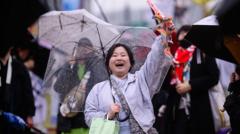In the wake of significant political decisions and societal unrest, South Korea is poised to elect a new president on June 3, as announced by the acting president Han Duck-soo, following the impeachment of Yoon Suk Yeol.
South Korea Sets Presidential Election Date Following Political Turmoil

South Korea Sets Presidential Election Date Following Political Turmoil
The country prepares for a vital leadership vote on June 3 after recent upheaval and uncertainty.
South Korea will hold a pivotal presidential election on June 3, as declared by acting president Han Duck-soo, after the constitutional court upheld Yoon Suk Yeol's impeachment due to his controversial martial law declaration. The court's ruling allows for a snap election within 60 days. Han urged the nation to "quickly heal from the wounds" of recent political turmoil and move "upward and forward." Yoon's alarming martial law announcement caused widespread political instability and demonstrated the deep societal divisions within the country.
Han openly apologized for the ensuing public confusion and distress during the presidency's vacant period. Initially justified by perceived threats from "anti-state forces" and North Korea, Yoon's martial law action soon became overshadowed by concerns over his domestic political challenges, leading to a separate insurrection charge. Several politicians are already eyeing the presidency, including labour minister Kim Moon-soo and established lawmaker Ahn Cheol-soo, who had previously run in three presidential elections.
However, the current frontrunner appears to be opposition leader Lee Jae-myung, who narrowly lost to Yoon in the 2022 elections. Recent polling shows Lee with a solid approval rating of 34%. As the nation strives to overcome its political crisis, it faces additional economic issues, notably the steep 25% tariffs on exports to the US imposed by President Donald Trump, prompting discussions for negotiations with the US administration.
Han openly apologized for the ensuing public confusion and distress during the presidency's vacant period. Initially justified by perceived threats from "anti-state forces" and North Korea, Yoon's martial law action soon became overshadowed by concerns over his domestic political challenges, leading to a separate insurrection charge. Several politicians are already eyeing the presidency, including labour minister Kim Moon-soo and established lawmaker Ahn Cheol-soo, who had previously run in three presidential elections.
However, the current frontrunner appears to be opposition leader Lee Jae-myung, who narrowly lost to Yoon in the 2022 elections. Recent polling shows Lee with a solid approval rating of 34%. As the nation strives to overcome its political crisis, it faces additional economic issues, notably the steep 25% tariffs on exports to the US imposed by President Donald Trump, prompting discussions for negotiations with the US administration.




















